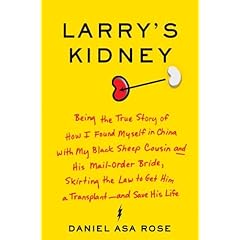Yesterday on the nationally-syndicated radio program, the Diane Rehm Show, the lead was, “Each year, more than a thousand people die because not enough kidneys are available.”
 The guest was Daniel Rose, author of Larry's Kidney: Being the True Story of How I Found Myself in China with My Black Sheep Cousin and His Mail-Order Bride, Skirting the Law to Get Him a Transplant--and Save His Life.
The guest was Daniel Rose, author of Larry's Kidney: Being the True Story of How I Found Myself in China with My Black Sheep Cousin and His Mail-Order Bride, Skirting the Law to Get Him a Transplant--and Save His Life.A book, book tour and press adulation for a man who openly broke the law in order to get his cousin Larry a life-saving transplant.
Then last night came the news we all heard: 40 people arrested, including 5 rabbis, etc. etc.
And something about illegal trafficking in body parts.
One of the guys they arrested, say the police, boasted on tape how many hundreds or thousands of kidney transplants he has facilitated (for a fee).
Most people I know think that organ donation is an ethical practice. The Jewish view is, like most ethical issues, nuanced.
- If you can save a life without endangering another life, it is not only a good thing to do, it is imperative.
- If you can save a life with some risk to another life, it is not imperative, but still a good thing to do.
- If you can only save a life by taking another life, it’s unethical.
For live donations, thanks to modern medicine, the risk to the donor is small.
For posthumous donations (what happens when you check the box on the back of your driver’s license), there is another issue: when does death happen? The medical community considers brain-death as the cut-off. Some Jewish ethicists define death as when all brain activity has ended, including in the brain-stem. According to them, if organs are removed before that point, the procedure is effectively killing the patient.
The second issue, and one which may connect us back to this week’s news, is the concept of kavod or respect for the body. An organ that is donated and for some reason not used should be buried respectfully. The trafficking in organs may lead to a degradation of this respect for the body (not to mention for the donors who risk being mistreated if organs become a market commodity).
One of the callers to the talk-show was in tears, for her 9-year-old son needs a kidney, and she was offended by the Daniel Rose’s back-door, under-the-table (i.e., illegal) pursuit of a kidney for his brother.
So here’s your question: Is it ever ethical to break the law in order to save a life? Does it make a difference whether it’s American law or Chinese law?
Shabbat Shalom
+ + + +
The goal of Table Talk is to give you a conversation-starter for the Friday night dinner table. Please print and share.
1 comment:
One way to do this is to attend Study Hall during lunch, before the next test. Another, powerful way is to make sure that they bring their COMPLETED NOTES to class on the day of the exam. To aid Students in completing their Notes, Mr. Hatfield makes them available on-line through this blog and gives a Study Guide for Students to complete to demonstrate that they have the Notes, and know what to do with them. Bring evidence that you have prepared for the test, students, and you will be rewarded! abc 4 kids , jogos friv gratis , 2player games
Post a Comment